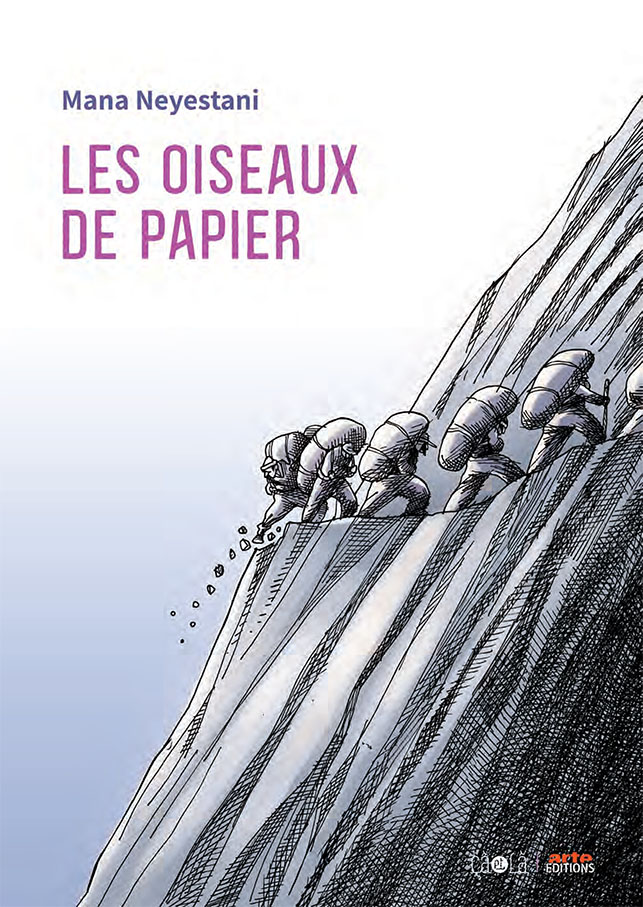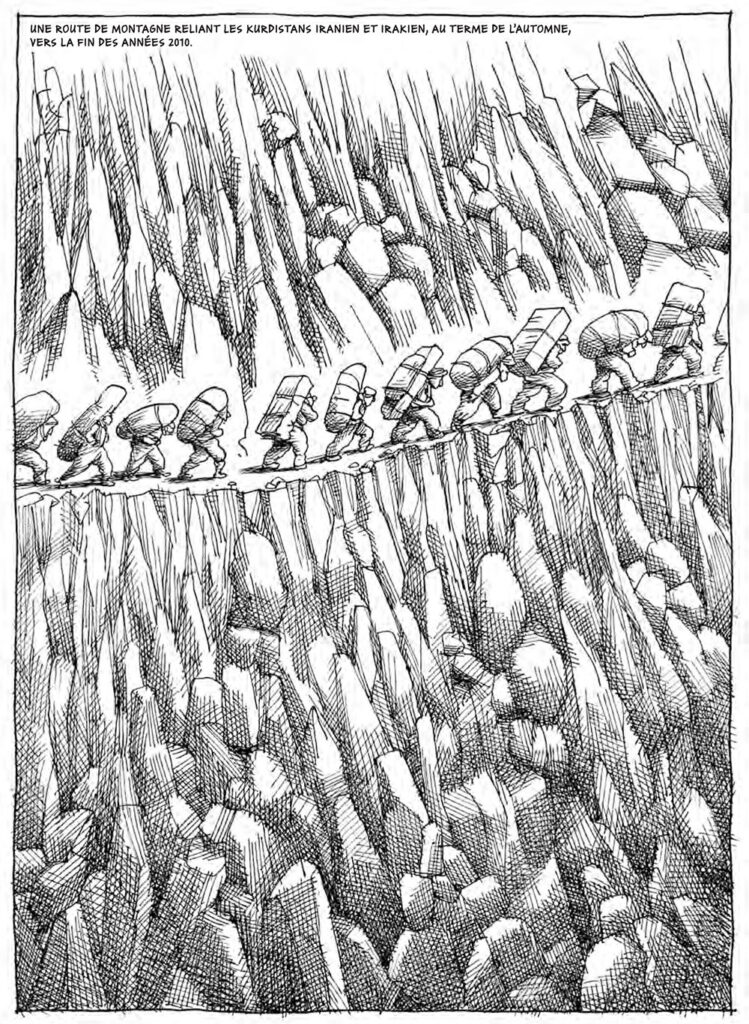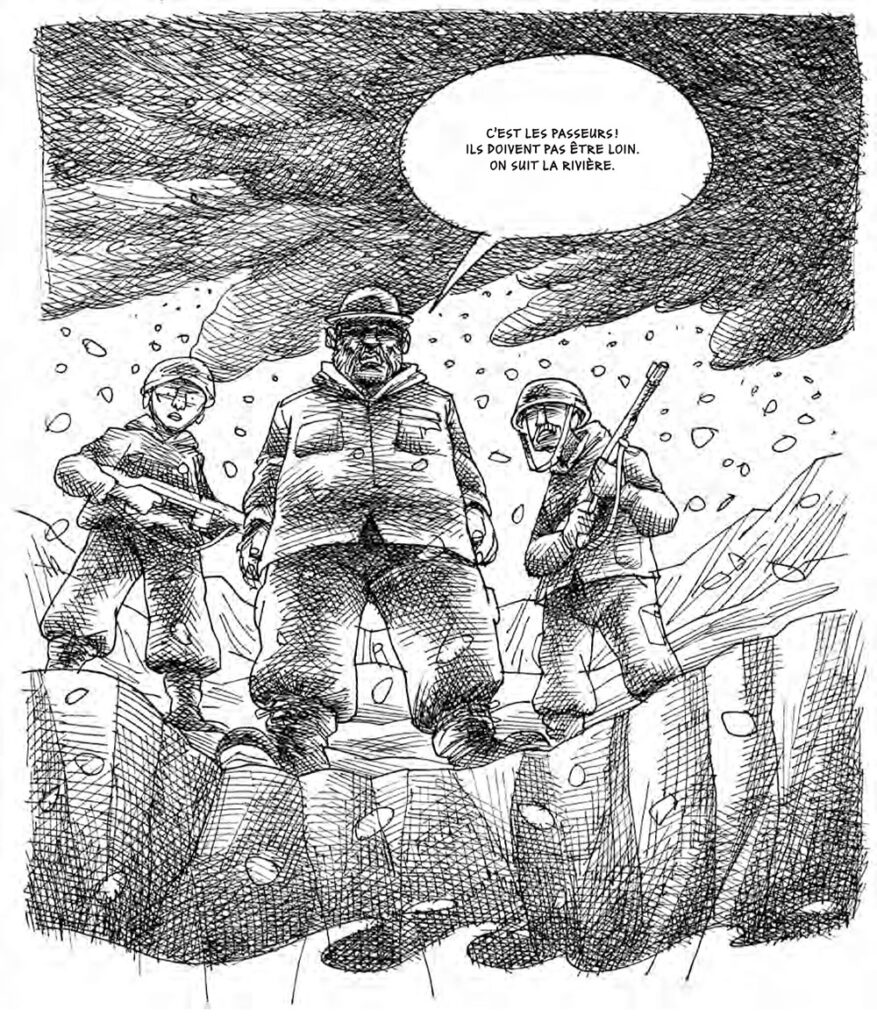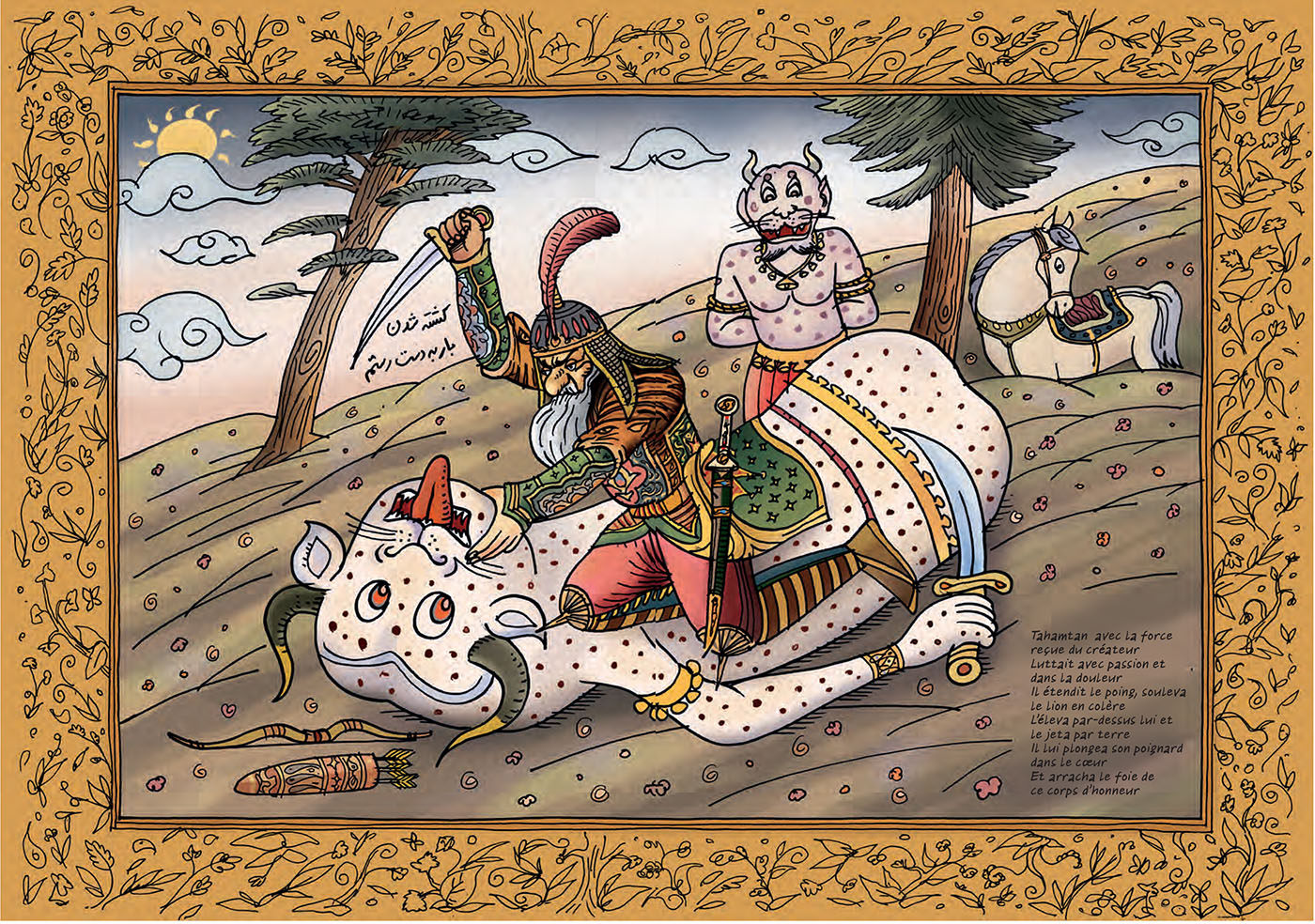Les Oiseaux de papier [The Paper Birds], a graphic novel by Mana Neyestani
Éditions çà et là 2023
ISBN 9782369903109
Clive Bell

Every week a porter is killed somewhere on the mountainous Iran-Iraq border, either in a snowstorm, an avalanche, or shot by a border guard. These porters, known as kolbars, are Kurdish, working in gangs to carry heavy loads of televisions, air conditioners or trainers across the border. The Western consumer goods are bodily transported along mountain tracks, impassable by car or truck. Thousands of Kurds risk their lives to do this highly dangerous and poorly rewarded work simply because there are few options in this area of high unemployment. Lug radiators on your back or starve. Recently more women are joining the kolbar teams.
This is the frightening world deeply penetrated in Mana Neyestani’s latest graphic novel, published in France, The Paper Birds, and his first foray into fiction after publishing several autobiographical graphic novels. We join a team of kolbars as they head into snowstorms, tangle with guards who shoot first and ask questions later, and wade across a freezing river where the bridge has been swept away. After five years research into Kurdish smuggling, including multiple conversations with actual Kurdish porters, Neyestani has created a group of memorable fictional characters, both funny and infuriating. These porters know each other all too well, and are heartily sick of their colleagues’ bad jokes and absurd habits. Poor Elias, a very short man with a tall wife, is the butt of frequent humor. The unemployed engineer Jalal, setting out at dawn to meet the kolbars at the river, mistakes Elias for a boy and tells him to stop smoking. Elias is regularly infuriated by his co-workers’ mockery, but when he tumbles into a river they all rush to haul him out and save him.
Neyestani, a veteran editorial cartoonist known in Iran and the West, has published six graphic novels. The graphic novella, The Crash, Covid-19 and Other Iranian Stories, published by IranWire, was his unflinching examination of government misinformation during the pandemic. In Iran, he was considered a threat by the authorities, who told him to draw art for children. He followed their advice but that got him into even hotter water. In 2006, he was jailed. Briefly released, he fled the country with his wife, and settled in France after several years moving from place to place. The cartoon that sparked the trouble with the Islamic Republic involved a conversation between a child and a cockroach, so Neyestani borrowed Kafka’s title to tell a complex autobiographical tale in his first graphic novel. An Iranian Metamorphosis, about his imprisonment, was a finalist for the 2014 LA Times Book Prize.

So far The Paper Birds is only available in French. Published under the title, Les Oiseaux de papier, it was translated from Persian into French, by the foreign language film specialist Massoumeh Lahidji. Neyestani’s French publishers, Éditions çà et là, is looking for a publisher for the English edition. However, bandes dessinées have a cultural resonance with the French (and Belgium) reading public they don’t have in the English-speaking world. It took two years for an English-language edition of An Iranian Metamorphosis to be published by Uncivilized Books, in Minneapolis, Minnesota. The graphic memoir, which has had only one printing in the US, has had six in France.
The good news for readers of French is that Neyestani’s storytelling is excellent, his artwork lucid and dramatic. As the tale heats up, the excitement builds, and there are action scenes of great danger. But in this world of sparse hope and fierce family morals, despair is always waiting around the corner. One of the most moving sequences shows Jalal encouraging 12-year-old Shanyar to go back to school rather than join the porters. Shanyar bites into his sandwich. “And what good did your studies do you?” he asks Jalal, who trained as an engineer but has been reduced to heaving parcels on his back.

Jalal takes the sandwich wrapper and folds it into a paper bird as a gift. But youngster Shanyar isn’t convinced: “It’s a bird with no feathers and no feet, that can’t fly.”
“You only have to imagine that it has all that, that it can fly away anywhere,” replies Jalal.
“Imagination won’t fill my stomach,” replies the boy. But his paper bird will return later to play a key role.
In the UK, where the adult graphic novel doesn’t have a long-standing tradition, it feels necessary to point out that Neyestani’s work is thoroughly adult and engaged in serious social comment. In The Paper Birds he has supplied a written preface and an afterword. Both provide facts, information and even a handful of photos showing the Kurdish kolbars. One shocking statistic reveals that, like the engineer Jalal in the story, more than half of these porters have university degrees. The Iranian government has repeatedly expressed its intention of improving the Kurdish border situation, but today the porters still risk their lives and die.
Before each chapter in this story of all-male porters, Neyestani cuts away to the thoughts of a young woman, named Rojan. She is weaving a carpet. Just a few more carpets need to be sold. Then she plans to escape with her lover to a city and a new life. In each chapter her carpet, a burst of color in this black and white world, has progressed further towards completion. But it’s vital that her father knows nothing of this, in the unforgiving moral world of rural Kurdistan.
In her story, too, a paper bird will play a crucial part. And one of Neyestani’s cunning story threads slowly reveals that the father and lover of Rojan are out there battling through the snow, among the kolbars.




